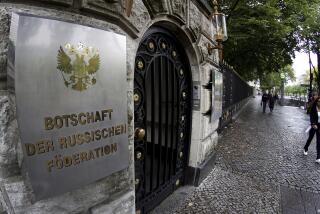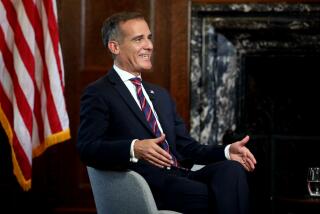Unification Leaves Thousands of Diplomats Out of Work : Foreign relations: Flustered nations ponder how to deal with double representation in a single Germany.
- Share via
BERLIN — When East German head of state Sabine Bergmann Pohl gathered ambassadors to her presidential quarters last week for a toast to German unity, the celebration was tinged with a note of apology.
The envoys, all 74 of them, had been put out of a job by the very event they had been called together to cheer.
Joining them in joblessness will be 2,000 East German diplomats, made redundant by the reunification taking effect today.
Merger of the two Germanys has flustered foreign ministries and state departments around the globe as they ponder how to deal with double representation without knowing where the capital of the single Germany ultimately will be.
Protocol, the code prescribing correct etiquette and diplomatic precedence to resolve most quandaries encountered abroad, offers no guidance on proper behavior in a disappearing country.
Berlin’s larger foreign embassies have simply been changing the nameplate on their buildings, labeling themselves consulates or branch offices of the elevated embassies they will report to in Bonn, which was the West German capital.
While the 1,000-page treaty outlining reunification clearly designates Berlin as the capital, the government intends to stay in Bonn for the time being, and foreign governments continue to recognize the Rhine River city as the seat of state pending a final decision that has been delayed indefinitely. But tradition beckons united Germany to move its government back to Berlin, making foreign nations hesitant to fold their tents in the East.
“If they are going to have the Parliament in Berlin, it seems only logical that Berlin would be the seat of the government as well,” said Igor V. Mironov, a protocol secretary at the Soviet Embassy compound in Bonn. “But this is not for us to decide. We have to keep both options open.”
Countries like the Soviet Union that had close ties to the East German state are better poised than their Western colleagues in the event Berlin is restored as capital. As a holdover from its status as a World War II victor, the Kremlin has at its command vast offices and housing that is the envy of other nations in overcrowded Berlin.
“We have plenty of room there. It would be absolutely no problem for us if the Germans decide to go to Berlin,” Mironov said in understatement.
While the other victorious powers, Britain, France and the United States, are likewise comfortably quartered in western Berlin, unification for them is more problematic. The coveted housing they have enjoyed under postwar occupation agreements reverts to the German government after today and will be offered for sale or rent on the skyrocketing open market.
All three Western allies plan to consolidate their embassies in the city, slimming their staffs to phase out the superfluous while waiting to learn whether Bonn or Berlin will be their eventual headquarters.
“The problem is, how does one deal with the new phoenix that will rise out of the ashes while trying to wind out the old operation?” said British Chancellor Colin Budd, among the perplexed Bonn attaches charged with blending three sizable facilities into one.
Procrastination is not an option, as the capital question may remain unresolved for years, and maintaining large missions in Berlin will become an increasingly expensive burden.
“After (unification), there will no longer be a U.S. embassy in East Berlin or a U.S. mission in West Berlin,” explained Anthony Sariti, the newly appointed press department chief for the East Berlin embassy, which has now been diplomatically demoted. “We will be combining the two entities into a third, but we don’t even know at this point what it will be called.”
The barreling pace of reunification caught many foreign missions by surprise and has complicated life for some envoys, including Sariti. He was reassigned from the West Berlin mission to the East German embassy before the date for reunification was fixed, which required him to move, at considerable government expense, to the eastern side of the city only a month before the distinction ceased to exist.
“The only down sides are personal,” Sariti said of the unification. “There are bound to be people who will have to curtail their careers because of this.”
No official orders have been issued to cut positions below ambassador, Sariti said. But diplomats in Bonn confirm that the attrition has already begun.
“We would love to have stayed another year, but there’s just no chance,” said the wife of a Bonn attache nearing the end of his two-year assignment.
Bonn was already one of the U.S. State Department’s biggest embassies, with about 450 on the staff that will now be joined by nearly 40 from East Berlin and 50 from West Berlin when those two representations combine and become a subordinate facility to the Rhine River enclave.
The U.S. ambassador to East Berlin, Richard C. Barkley, has already been recalled by Washington and superseded by the ambassador to Bonn, Vernon A. Walters.
Career diplomats like Barkley are likely to fare well despite the quirk of history that has robbed them of their postings.
In contrast, East Germany’s envoys will be left by the diplomatic wayside. Most were loyal servants of the Communist Party, and West German officials feel such people have little to contribute to a united, democratic state.
East German missions abroad are already practically abandoned, as attaches have hurried back home in hopes of landing new employment. The East German mission in Bonn, once teeming with dozens of diplomats grudgingly granting visas and relaying messages between East and West, was down to a single receptionist more than a week before its official shuttering.
While hardships are the consequence of unity for the displaced statesmen, the doyen of the foreign diplomatic corps in East Berlin deemed their sacrifices insignificant in the light of the broader, dramatic developments.
“All of us have accepted the peaceful change in East Germany with a sense of wonder,” Lebanese Ambassador Josef Akl told his colleagues at Bergmann Pohl’s farewell reception. All leave East Berlin with the gratification of knowing “we were there when it happened.”
More to Read
Sign up for Essential California
The most important California stories and recommendations in your inbox every morning.
You may occasionally receive promotional content from the Los Angeles Times.














